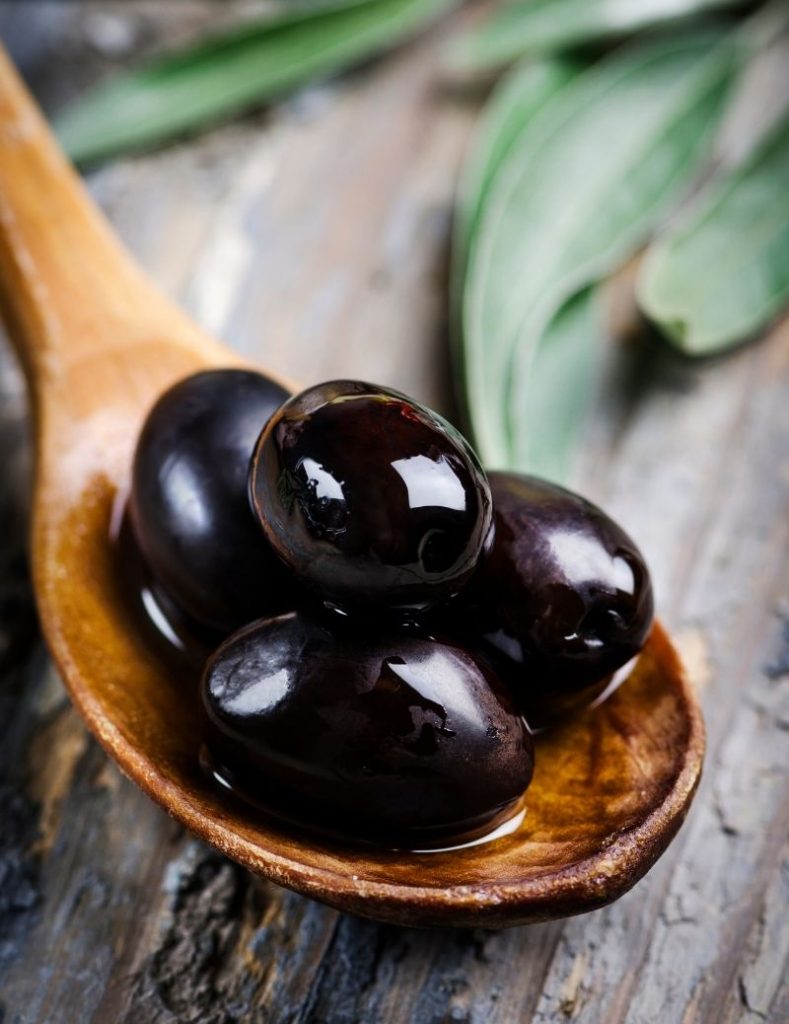Before feeding any human food to your dog, you must know how safe it is and the possible implications of the meal — black olives are no exception.
Olives have many nutritious benefits to humans. But, can dogs eat black olives? Caution must be applied when you want to feed them to a dog.
Certainly, olives are ancient. The olive tree (as we know it today) is considered one of the oldest trees in the world, existing for more than 6,000 years.
The origin of this tree dates back 20 to 40 million years, to an area once known as the Oligocene.
In our current world, it has many uses. The most common use is olive oil. The fruit is also cultivated and eaten by many.
There are many varieties of olives, but the most common in the United States is green and black olives.
Both green and black olives have nothing toxic that can harm dogs, so you can feed one to a pleading dog and not have a medical case in your hands. It even helps a dog’s system in some ways.
That said, you should hesitate before serving your dog too many olives, whether green or black.
In the following sections, we’ll look at the difference between black and green olives, the benefits of black olives, the possible downsides, and other pieces of information.
Olives: An Overview
Olive fruit. Olive oil. Olive leaf. In its numerous versions, there has always been something special and ethereal about olives.
From being an integral part of Judeo-Christian religious ceremonies to playing crucial roles in the Greco-Roman world, olives have been significant in human civilization.
It also symbolizes peace, and an olive leaf during warfare is a call for a ceasefire.
Nowadays, it still retains its religious implications. Nevertheless, it has transcended from the sacred to the secular and is used in many cuisines around the world. It is heralded for its health benefits.
Black olives differentiate from green olives by being harvested only when fully ripe. Green olives reach maturity when unripe, and are harvested that way.
Both forms of olives are too bitter to be eaten raw, so they get cured to remove the bitter chemical named oleuropein.
Having known this, let’s look into the predominant question guiding this article.
Can Dogs Eat Black Olives?
If you need a direct answer, then yes, dogs can eat black olives. There’s nothing toxic in black olives to suggest otherwise.

Your dog won’t have a seizure or get a terminal disease because of black olives, so a bite won’t hurt.
Of course, it can’t be that easy with human food. A dog’s digestive system isn’t a photocopy of ours, so it doesn’t digest food the same way.
What our bowels can accept may overwhelm a canine, to the point of ill health.
What does this mean for olives?
Notwithstanding the benefits, black olives shouldn’t be fed to dogs like the main meal. Moderation is the key, and it is best to take things slow when introducing olives to a dog.
When you follow the rules, black olives are a plus to a dog’s health.
Are Black Olives Good for Dogs?
Black olives have much good stuff to offer, and humans aren’t the only beneficiaries.
Dogs can take a bite of this sacred fruit and see changes in their body (nothing spooky, though).
Let’s take a look at the nutritional value of a 100-gram black olive:
| Black Olives (100g) | Amount |
|---|---|
| Calories | 115 |
| Water | 80% |
| Carbohydrates | 6.3g |
| Protein | 0.8g |
| Sugar | 0g |
| Fiber | 3.2g |
| Fat | 10.7g |
For starters, let’s look at the fat content in black olives. While it may seem too much, the fat in black olives is monounsaturated.
It helps reduce inflammation in dogs and aids senior pooches dealing with arthritis. It also regulates the blood pressure and cholesterol level of dogs.
Black olive plays a unique role to white dogs like the Chihuahua as it helps their skin, especially when the latter is dry.
Perhaps the biggest advantage of black olive is its contributions towards battling cancer and diabetes in dogs. It improves the heart and cognitive functions of dogs as well.
Taking these into consideration, what can make black olives a problem for dogs?
Related: Can Dogs Eat Dragon Fruits?
Are Black Olives Bad for Dogs?

When you flout the rules of moderation or your pooch mischievously does, black olive has its red lights. While not toxic to dogs, it can have repercussions.
Some of the issues that may make black olives bad for dogs include:
1. The high sodium level
You will encounter this problem more from store products. Black olives in cans or pickles have a lot of salt, which is bad for a dog’s system.
An overload of sodium can dehydrate a dog, and this is the minimum risk.
Over time, sodium can increase a dog’s blood pressure, affect his kidneys and make him suffer from salt poisoning. All these conditions are serious and will require medical attention.
2. Stuffed olives may contain poisonous ingredients
The preservatives, spices, seasonings, and other fillings may not endanger a human, but it spells danger for dogs. Garlic is an example of such ingredients.
Not only vampires do get affected by this allium spp offspring. Studies have proven that garlic causes hemolytic anemia in dogs—the destruction of red blood cells.
Some other unsuitable elements used in packaged olives include anchovies, blue cheese, and feta cheese.
Olives used as pizza toppings or on cocktails are unhealthy for dogs too.
3. Olives stones can choke a dog
Olives are called stone fruits because of the pits, also referred to as stones.
These stones should be removed if you want to feed your dog with any form of olive. They can choke your dog if he swallows these stones.
4. Stale and old black olives are deadly
While a human may get away with eating old black olives (though it’s best left for the trash), dogs may experience seizures and other serious side effects.
Always feed your dog fresh black olives. They are safer and less likely to put a dog in bad condition.
Related: Can Dogs Eat Grapefruit?
How Many Black Olives Can a Dog Eat?
A veterinarian is in the best position to fill you in on what’s considered appropriate for a dog concerning black olives and other fruits.
Thus, you should visit your vet before including black olives in a dog’s feeding plan.
As a general guideline, you can feed your dog some olives once in two weeks. Watch out for any signs of allergies or disinterest. If your dog has a sensitive stomach, go slower.
If you notice any unusual signs, perhaps another fruit will be better for your furry paddy.
What Will Happen if a Dog Eats Black Olives?
A moderate amount of black olives shouldn’t affect a dog unless he is allergic. Instead, it will be advantageous to him.
You shouldn’t be concerned if your dog chews on a little black olive.
However, if he free feeds on black olives, we have a problem. He may have a simple stomach upset if his middle name is Lucky.
In more serious cases, one or more of the health risks we’ve mentioned may happen. If it gets to this level, early diagnosis is your best bet.
What Should I Do If My Dog Eats Too Many Black Olives?

When you notice that your dog has eaten more than the recommended number of black olives, it is best to err on the side of caution.
Get a veterinarian on the line, even if your pooch hasn’t displayed any unusual symptoms. Fast treatment could save your dog’s life.
Also, make sure he doesn’t consume more than he already has. This would mean keeping away any other black olive or using a command to stop him from eating.
Observe when he ate, and the number he consumed. The veterinarian may ask questions to that effect during diagnosis.
Are black olives poisonous?
Black olives are usually bitter when raw, but have no harmful ingredient or nutrient that makes them inedible for dogs. It can’t be eaten raw, though, because of the chemical named oleuropein that makes it bitter.
Are canned black olives healthy?
Canned black olives often contain brine that is high in sodium. An excess amount of sodium affects humans and endangers dogs. It is better to give your dog fresh olives.
Can dogs and cats eat black olives?
Dogs can eat black olives, and the latter will benefit canines well. However, it should not be given to them regularly. Cats can also eat olives moderately.
Can dogs have green olives?
Besides a few differences, green and black olives are the same. They offer similar nutrients to dogs and pose the same risks. Dogs can eat green olives, but with caution.
Bottom Line: Can Dogs Have Black Olives?
Every pet parent should be intentional about what they feed their pets. Some foods and fruits are best avoided when it comes to dogs.
Fortunately, dogs can eat black olives as they are edible and nutritious to canines.
Olive is healthy for canines, providing vitamins and other valuable nutrients.
Do not forget the warnings given and the few risks of black olives to dogs. With enough care, you can avoid these side effects and add something new to your dog’s diet.
You May Also Like: Can Dogs Eat Brussel Sprouts?







